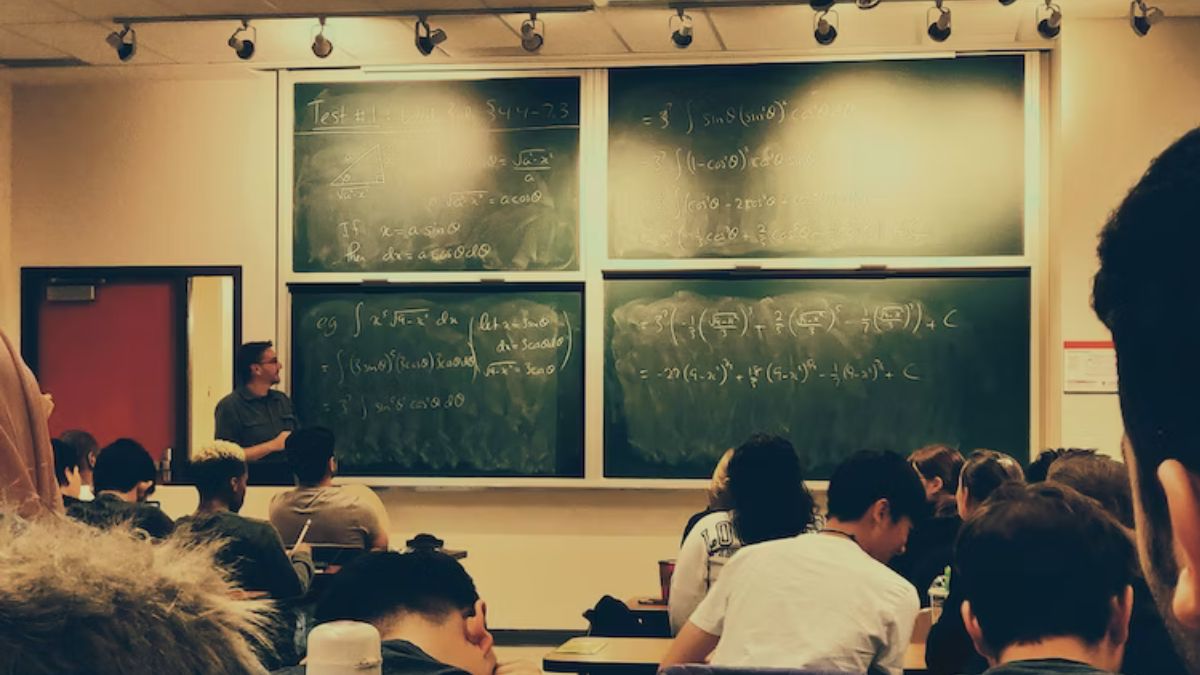The field of calculus connects the dots between more theoretical mathematical ideas and their practical uses. It offers a potent toolbox for studying motion, change, and the operation of intricate systems. In this essay, we will delve into the relevance of calculus, its fundamental concepts, and its numerous and varied applications.
Many people think of mathematics as a language that may be used to describe the rules by which the universe operates. Calculus is essential to the study of continuous change and motion within this broad field of mathematics. Calculus provides a method for analyzing and solving difficult issues in many fields, from physics and engineering to economics and computer science, by utilizing the tools of differentiation and integration.
What is Calculus?
To put it simply, calculus is the mathematical study of motion and change. Both differential and integral calculus are essential parts of it. Integral calculus is concerned with accumulation and the area under curves, while differential calculus is concerned with rates of change and slopes. Both of these subfields are essential to the rest of calculus and depend on one another.
The Importance of Calculus
Applications in Physics and Engineering
The wide variety of uses calculus has in the physical and engineering sciences is a big reason for its prestige. It equips you to examine motion, forces, and energy, among other physical phenomena. By using calculus, physicists and engineers may create realistic simulations of systems and make reliable predictions about their behavior. Calculus is essential in many areas, from predicting the path of a projectile to improving the layout of a bridge.
Understanding Rates of Change
Understanding rates of change is made possible through calculus. Calculus provides a framework for quantifying and interpreting changes, whether in the speed of an object, the expansion of a population, or the rate at which a chemical reaction happens. The derivative of a function provides an exact way to quantify a quantity’s evolution in respect to another.
Fundamental Concepts in Calculus
Differentiation
The derivative of a function can be calculated by differentiating the function. A quantity’s rate of change in relation to another variable is represented by its derivative. The function’s concavity, instantaneous rate, and slope are all revealed. Determining extrema, optimizing functions, and comprehending curve behavior are only few of the many uses for the derivative.
Integration
Differentiation is the opposite of integration. Integrating or determining the antiderivative of a function falls under this category. Area under a curve can be found by integrating the distance between two points on the curve. Motion, calculating areas, and determining sums or cumulative values are all areas in which integration plays a crucial role in problem resolution.
Limits
The concept of a limit is fundamental to calculu’s because it allows us to analyze how a function changes as a variable approaches a given value. Derivatives and integrals, as well as continuity and the convergence of sequences and series, rely heavily on the concept of limits for their definition and interpretation. They allow us to analyze functions whose behavior is infinite or undefined and serve as a basis for the accurate specification of calculu’s concepts.
Types of Calculus
Differential Calculus
The study of rates of change is at the heart of differential calculu’s. Understanding the behavior of functions at discrete places requires finding derivatives, calculating slopes, and so on. Physics, engineering, economics, and even computer science all make use of differential calculu’s to varying degrees.
Integral Calculus
The field of integral calculu’s is concerned with the calculation of areas under curves and the accumulation of quantities. It requires solving definite and indefinite integrals as well as discovering antiderivatives. The fields of physics, economics, statistics, and engineering, among others, all rely heavily on the tools provided by integral calculu’s.
Multivariable Calculus
Functions that involve more than one variable are the focus of multivariable calculu’s. It paves the way for the study of complex systems and the comprehension of how they operate in spaces with multiple dimensions. Physics, finance, computer science, and engineering are just few of the many disciplines that rely heavily on multivariable calculu’s because of the complex nature of the variables and interactions they study.
Real-Life Applications of Calculus
Calculus is useful in many real-world contexts, where it helps us solve issues and make predictions. Among the most notable uses are:
Optimization Problems
The purpose of optimization problems is to find the maximum or least value of a function, and calculu’s gives methods for addressing these issues. This is especially helpful in the fields of engineering, economics, and resource management. Calculu’s can be used to figure out the best possible dimensions for a container, so that its volume is maximized while the amount of material used is kept to a minimum.
Motion and Velocity
Calculu’s is crucial to the understanding of motion. With the help of calculu’s, we may determine the location, speed, and acceleration of an object as it travels along a curve or in some other complex motion. Understanding the behavior of moving things, such the trajectory of a bullet or the motion of celestial bodies, requires the calculation of derivatives and integrals.
Growth and Decay
The study of growth and decay requires the use of calculu’s. Population growth, radioactive decay, compound interest, and disease transmission can all be simulated using this tool. The rate at which these processes occur can be analyzed with calculu’s, and their future behavior can be predicted.
Economics and Finance
Calculu’s is crucial in the fields of economics and finance because it permits the analysis of market dynamics, the optimization of investment strategies, and the determination of key economic indicators. It lays you the necessary structure for economic and financial optimization problems including determining marginal utility and profit and analyzing supply and demand curves.
Calculus in Technology and Engineering
Numerous engineering and technological developments owe a great deal to calculu’s. Here are just a few of the most prominent applications of calculu’s:
Computer Graphics
Computer graphics rely heavily on calculu’s since it facilitates the generation and modification of digital images. Calculu’s aids in the definition of curves, surfaces, and motion inside computer-generated settings, which is useful for everything from generating 3D scenes to recreating realistic animations.
Electrical Engineering
Circuits, control systems, and electrical networks are all areas where electrical engineers use calculu’s in their analysis and design processes. It helps engineers analyze electrical signals, determine voltage and current changes, and fine-tune electronic systems.
Robotics
Calculu’s is essential in robotics since it allows for the planning and management of automated systems. Engineers can optimize the motion of robotic manipulators and create path planning and control algorithms by modeling the kinematics and dynamics of these devices with calculu’s.
Challenges in Learning Calculus
Calculus offers potent methods for tackling hard issues, but mastering it is not without its difficulties. Some typical learning challenges are:
Complex Notation and Symbols
The unique set of mathematical symbols and terminology used in calculu’s might be intimidating to those new to the field. It is essential for explaining and solving calculus problems that you understand and can manipulate these symbols.
Abstract Concepts
Limits, derivatives, and integrals are just some of the abstract ideas dealt with in calculu’s, and they may or may not have concrete real-world analogues. To make sense of these intangible concepts, one must modify their way of thinking and hone their intuition via experience and application.
Mathematical Rigor
Mathematical correctness and rigor are essential for success in calculu’s. Proof of theorems, problem solving, and interpretation of conclusions all call for a level of rational thought and precision. Building strong skills in algebra and trigonometry is crucial for success in calculu’s.
Tips for Learning Calculus
Calculus is a difficult yet worthwhile subject to study. Achieve your goals using the following advice:
Start with the Basics
Learn the basics of calculu’s first, including what limits, derivatives, and integrals are. Get your feet firmly planted by learning the fundamentals thoroughly before going on to more difficult material.
Practice and Problem Solving
The greatest way to master calculu’s is by doing it. To better retain the material and hone your problem-solving abilities, try your hand at a wide range of problems drawn from both textbooks and practical contexts. To maximize your education, look for materials that include both exercises and answers.
Seek Help and Resources
Don’t be afraid to ask for assistance if you need it. Get in touch with your instructor, join a study group, or make use of tutorials and study materials found online. The internet is rife with resources for learning and practicing calculu’s, including webpages, videos, and discussion boards.
Conclusion
Calculus is an essential bridge between theoretical mathematics and practical situations. Its ideas and methods help us examine and comprehend motion and complex systems in flux. Calculu’s is essential in many disciplines, from physics and engineering to economics and technology, where it drives innovation and provides potent tools for problem solving. Gaining proficiency in calculu’s and using its concepts effectively is the key to opening the door to a more complete comprehension of the world.
FAQs (Frequently Asked Questions)
Is calculus difficult to learn?
A1: Calculu’s can be challenging, but with dedication and practice, it can be mastered. Starting with the basics, seeking help when needed, and engaging in problem-solving exercises can greatly facilitate the learning process.
What are some common applications of calculus in everyday life?
A2: Calculu’s finds applications in various everyday scenarios, such as determining optimal solutions, analyzing motion and growth, and making economic predictions. Examples include optimizing travel routes, calculating compound interest, and modeling population growth.
How can calculus be used in engineering?
A3: Calculu’s plays a crucial role in engineering, enabling the analysis and design of structures, electrical systems, and control mechanisms. It helps engineers optimize designs, understand physical phenomena, and develop efficient solutions.
Are there any online resources to aid in learning calculus?
A4: Yes, there are numerous online resources available for learning calculu’s. Websites, video tutorials, and online courses provide explanations, examples, and practice problems to enhance understanding and mastery of calculu’s concepts.
How does calculus contribute to technological advancements?
A5: Calculu’s is instrumental in various technological fields. It enables computer graphics, electrical engineering, and robotics by providing tools for modeling, simulation, and optimization. Calculu’s drives innovation and facilitates the development of advanced technologies.











